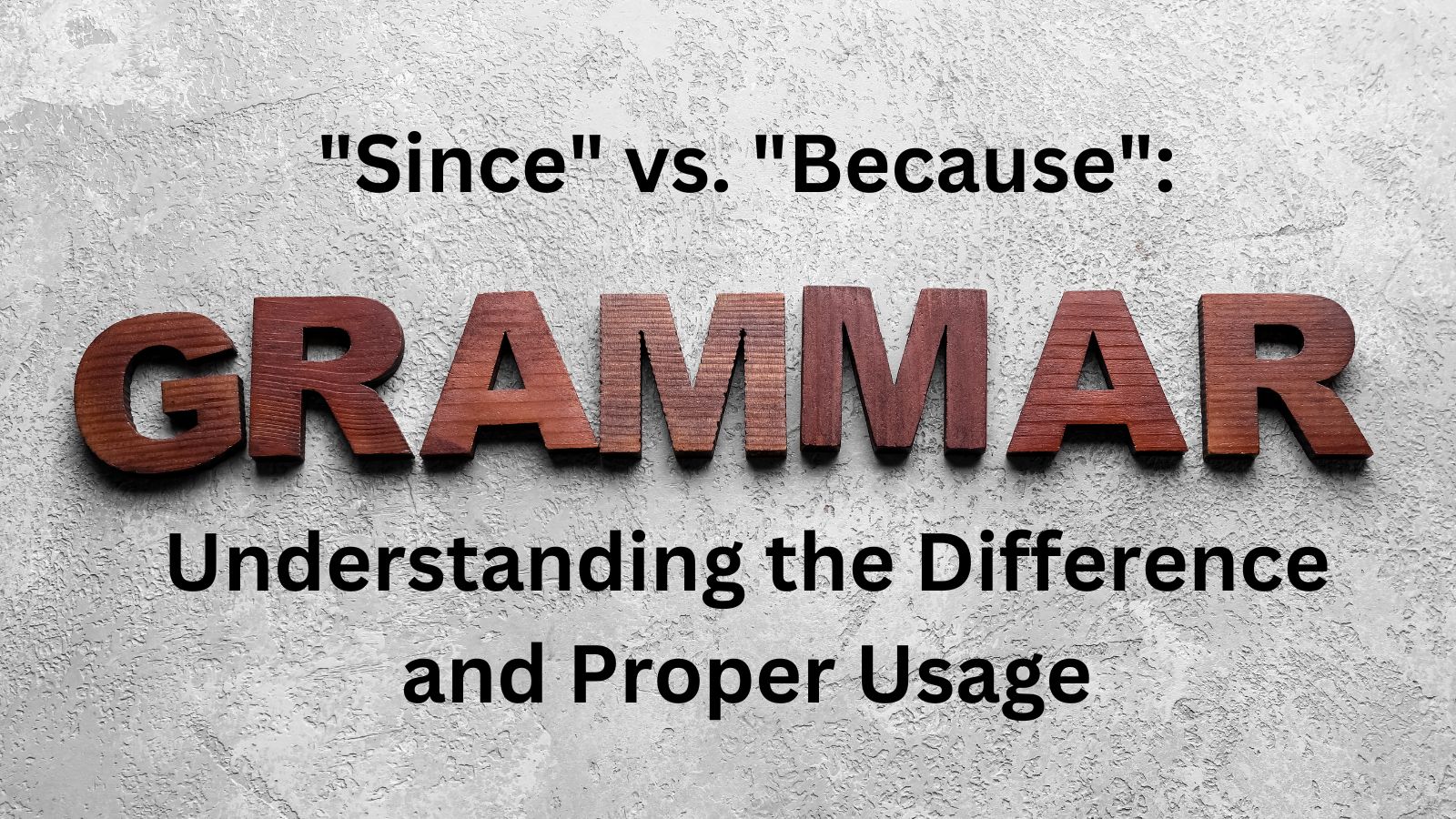
“Since” vs. “Because”: Understanding the Difference and Proper Usage
In the English language, “since” and “because” are two conjunctions that are often used interchangeably. However, these words have distinct meanings and uses that are important to understand for clear and effective communication. This article will explore the differences between “since” and “because,” as well as provide guidance on how to use them correctly in your writing.
The primary difference between “since” and “because” lies in their relationship to time and causality. “Since” is used to refer to a specific point in time or to indicate that something has been happening from a particular moment up to the present. For example:
- I haven’t seen her since last Monday.
- Since moving to the city, he has been exploring new restaurants every weekend.
In these sentences, “since” is used to indicate a specific time or a duration of time.
On the other hand, “because” is used to express a reason or to show a cause-and-effect relationship between two things. It explains why something happens or why someone does something. For example:
- I couldn’t attend the party because I had to work late.
- She decided to study medicine because she wanted to help people.
In these sentences, “because” is used to provide a reason or explanation for an action or situation.
A common mistake is to use “since” when “because” is more appropriate. While “since” can sometimes be used to imply causation, it is generally better to use “because” when you want to clearly express a reason. Consider the following examples:
- Incorrect: I fell asleep early since I was exhausted from work.
- Correct: I fell asleep early because I was exhausted from work.
In the first sentence, using “since” suggests a time-related reason for falling asleep early, which can be confusing. The second sentence, which uses “because,” clearly states the reason for falling asleep early.
To avoid confusion and ensure clarity in your writing, use “since” when referring to time and “because” when expressing a reason or cause. Keep in mind that while there may be some overlap in certain contexts, sticking to these general guidelines will help you communicate your ideas more effectively.
In conclusion, understanding the difference between “since” and “because” is essential for precise and effective communication in English. By using “since” to refer to time and “because” to express reasons, you can avoid common mistakes and ensure that your writing is clear and easily understood by your readers.
Entomology
The words “since” and “because” have interesting etymologies that can help us better understand their meanings and uses.
Since: The word “since” comes from the Old English word “siththan,” which is derived from the Proto-Germanic “*sith,” meaning “after.” The Proto-Germanic word is believed to have originated from the Proto-Indo-European root “*sey-,” meaning “to send” or “to let go.”
Over time, the Old English “siththan” evolved into the Middle English “sithens,” “sithenes,” and “sins.” By the 16th century, the word had taken on its modern spelling, “since.”
Originally, “since” was used as an adverb meaning “after that” or “from then on.” Later, it also began to be used as a preposition and conjunction, indicating a specific point in time or a duration of time.
Because: The word “because” is derived from the Middle English phrase “by cause,” which literally means “by reason of.” This phrase was used to introduce a reason or explanation for something.
The word “cause” itself comes from the Old French “cause,” which is derived from the Latin “causa,” meaning “reason,” “motive,” or “legal case.” The Latin word is believed to have originated from the Proto-Indo-European root “*kewh-,” meaning “to strike” or “to cut.”
Over time, the phrase “by cause” fused into a single word, “because,” which retained the meaning of introducing a reason or explanation.
Interestingly, the word “because” has also given rise to the informal phrase “because reasons,” which is used humorously or sarcastically to avoid providing a specific explanation for something.
Understanding the etymologies of “since” and “because” can help us appreciate the historical context and evolution of these words, as well as their distinct meanings and uses in modern English.
20 practice questions
Using “since” and “because” correctly. Fill in the blank with either “since” or “because” to complete each sentence.
- I haven’t eaten anything _____ breakfast.
- She decided to quit her job _____ she wanted to pursue her passion.
- _____ the store was out of stock, I had to order the item online.
- He has been living in London _____ 2015.
- I couldn’t go to the concert _____ I had a prior commitment.
- _____ you left, I’ve been feeling lonely.
- The plant died _____ I forgot to water it.
- _____ the accident, she has been afraid of driving.
- I’m running late _____ there was heavy traffic on the way.
- _____ we last met, I’ve started a new job.
- The flight was delayed _____ of bad weather.
- I’ve been studying Spanish _____ I was in high school.
- She couldn’t attend the wedding _____ she was ill.
- _____ the power outage, we had to use candles for light.
- I’ve been saving money _____ I want to buy a house.
- _____ the last time I saw her, she has changed a lot.
- He couldn’t concentrate _____ he was tired.
- I’ve been waiting for your call _____ yesterday.
- The event was postponed _____ of the pandemic.
- _____ you insisted, I’ll join you for dinner.
Lesson Plan: Understanding and Using “Since” and “Because”
Objective: Students will learn the difference between “since” and “because” and will be able to use them correctly in sentences.
Duration: 45-60 minutes
Materials:
- Whiteboard and markers
- Handouts with explanations and example sentences
- Practice worksheets
Introduction (5-10 minutes):
- Begin by asking students if they know the difference between “since” and “because.”
- Explain that while these words are often used interchangeably, they have distinct meanings and uses.
Explanation (15-20 minutes):
- Write “since” and “because” on the whiteboard.
- Explain that “since” is used to refer to a specific point in time or to indicate that something has been happening from a particular moment up to the present.
- Provide examples: “I haven’t seen her since last Monday.” “Since moving to the city, he has been exploring new restaurants every weekend.”
- Explain that “because” is used to express a reason or to show a cause-and-effect relationship between two things.
- Provide examples: “I couldn’t attend the party because I had to work late.” “She decided to study medicine because she wanted to help people.”
- Highlight the common mistake of using “since” when “because” is more appropriate.
- Provide an example: “Incorrect: I fell asleep early since I was exhausted from work.” “Correct: I fell asleep early because I was exhausted from work.”
- Distribute handouts with explanations and example sentences for students to refer to.
Practice (15-20 minutes):
- Divide the class into pairs or small groups.
- Distribute practice worksheets with fill-in-the-blank sentences and short writing prompts.
- Have students work together to complete the worksheets, using the explanations and examples from the handouts.
- Circulate the room to provide guidance and answer questions as needed.
Review and Feedback (5-10 minutes):
- Bring the class back together and review the answers to the practice worksheet.
- Encourage students to share their sentences and provide feedback on their usage of “since” and “because.”
- Address any remaining questions or concerns.
Closing (2-3 minutes):
- Recap the main points of the lesson: “since” is used for time, and “because” is used for reasons.
- Encourage students to continue practicing using “since” and “because” correctly in their writing and speaking.
Extension:
- Assign homework where students write a short paragraph describing a personal experience, using “since” and “because” correctly.
- Provide additional practice worksheets or online exercises for students who need more support.
- 100 Screenwriting Ideas to Get You Writing - January 20, 2026
- 100 Winter Storm Writing Prompts - January 17, 2026
- 100 Haunted House Story Starters: Craft Your Scariest Tale Yet - January 10, 2026



